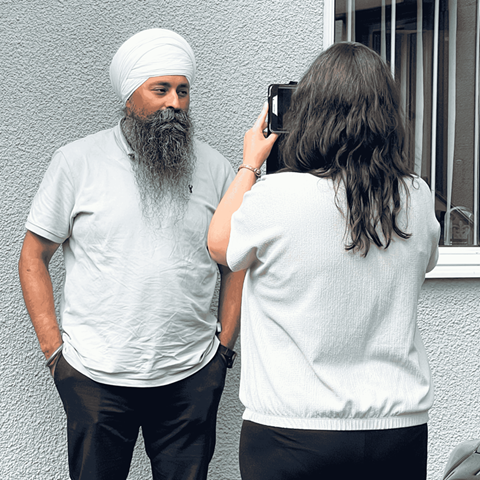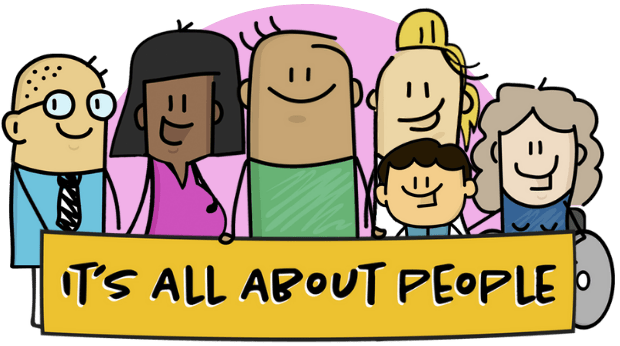Become a Community Reporting Trainer and put real life stories at the heart of health and care change in Lincolnshire
The time for stories is now!
The It’s All About People team and Lincolnshire Voluntary Engagement Team (LVET) are working in partnership with the national charity, People’s Voice Media, to bring Community Reporting to Lincolnshire.
We’re now recruiting Community Reporting Trainers from health, social care and the voluntary/community sector in Lincolnshire.
Join this exciting new project to gather and mobilise people's stories from across Lincolnshire - and train others to do the same!
Community reporting is a grassroots media model that helps people share their stories and perspectives to drive social change.
Community reporting can drive change by:
- Amplifying voices: Community reporting gives people a platform to share their stories and experiences, which can help challenge perceptions and create a more accurate picture of people's lives.
- Building connection: Community reporting can help people build connections with others in their community and with organizations that can help bring about change.
- Fostering understanding: Community reporting can help people understand each other better and work together to create positive change.
So, are you…
- Passionate about helping people to get their voices heard?
- Keen to make sure people’s real experiences inform change?
- Ready to use and develop your skills and experience to train other people?
Then, becoming a Community Reporting Trainer could be for you!
So, how do I apply to become a Community Reporting Trainer?
To apply, complete the Expression of Interest form and submit this by 7 February 2025. Places are limited, so don’t miss out!
And don't forget to put the key projects dates in your diary! The project starts on 25 February - see the full list of project dates below.
Find out more about Community Reporting and becoming a Community Reporting Trainer below.
What does the Community Reporting Trainer role involve?
- You'll gather and share people’s stories in line with Community Reporting methodology and the Foundations of Our Shared Agreement.
- You'll inspire and motivate others by sharing your enthusiasm for the power of people’s experience.
- You'll deliver Community Reporter training for a diverse range of people within communities and / or the health and care workforce in Lincolnshire.
What commitment do I need to make?
- You'll complete the Community Reporter training.
- You'll then gather and analyse a few stories.
- This is followed by a 2-day 'Train the Trainer' programme.
- The whole programme includes Community Reporting tools / techniques, gathering / curating stories, and how to train other Community Reporters.
- Trainers will need to be able to deliver at least one Community Reporter workshop per year, which may be co-delivered alongside other Trainers.
See the Community Reporting Project Key Dates below.
What’s in it for me / my organisation?
You'll build skills around qualitative learning within your own organisation, and contribute to a library of Lincolnshire ‘shared stories’ to inform learning and service development across health and social care.
- You'll enhance your own and others’ personal and professional development.
- You'll receive support and resources from People’s Voice Media.
- You'll receive ongoing support from the It’s All About People Personalisation Team.
- You'll increase confidence, capacity, and skills in storytelling, community research, and Our Shared Agreement.
- You'll be part of an active network, with peer support from other Community Reporters and Trainers.

What does a Community Reporter do?
Community Reporters:
- Gather stories: Using a diverse range of insight storytelling techniques, People’s Voice Media support Community Reporters to use digital devices and the internet to gather and share their own (and their peers') stories of lived experience.
- Curate stories: Working with People’s Voice Media, Community Reporters analyse stories to identify insights and package them in a range of ways such as edited films, interactive reports, visualisations and much more.
- Mobilise stories: People’s Voice Media support Community Reporters to connect curated stories to decision-makers and change-makers, who can use the insights to create positive change. This could include evaluating and improving services, supporting co-design, informing strategic development, and much more.
Community Reporting provides opportunities for people to use storytelling to:
- Find their voice: Through storytelling, we can have our say on topics pertinent to our lives.
- Challenge perceptions: Through listening to different experiences than our own, our understanding of the world can widen.
- Be catalysts of change: Through taking responsibility to act on what we have learned from other people’s experiences we can be part of positive social change.
At the core of Community Reporting lies the belief that every voice holds value.
Where can I find out more about the Community Reporting Trainer role and the project?
To find out more, DOWNLOAD the Community Reporting Trainer Job Description and the Community Reporting Project Outline below:
What are the aims and objectives of the Community Reporting project?
Aims
To develop capacity amongst the workforce, and use Community Reporting as a tool for gathering insights to support co-production and service improvement across health, social care, and community-based support in Lincolnshire.
Objectives
- To develop skills and knowledge within the workforce and the community in terms of working with lived experience storytelling.
- To establish an ‘insight engine’ to capture experiences relating to health, care and wellbeing, for use by partner organisations and communities
- To ensure people’s voices are heard as part of research, innovation, co-production, and continuous improvement connected to Our Shared Agreement.
Find out more about Community Reporting
Visit https://peoplesvoicemedia.co.uk/approach/ for more information about the Community Reporting approach.
Alternatively, watch the video below:
I'm interested! Can I join Lincolnshire’s new network of Community Reporting Trainers?
Yes!
We’re looking for people working in health, social care, or the voluntary / community sector who are keen to use Community Reporting techniques to enhance the work they already do, and be part of building a Lincolnshire-wide library of people’s experiences focused on health, care, and wellbeing.
Perhaps you work in a people-facing role, or engagement, co-production, community development, or with people from communities that are often marginalised or excluded?
Maybe you are in a setting where you work alongside people to develop skills and confidence?
Whatever your health, care or wellbeing background, we'd love to hear from you!
So, how do I apply to become a Community Reporting Trainer?
To apply, complete the Expression of Interest form and submit this by 7 February 2025. Places are limited, so don’t miss out!
And don't forget to put the key dates in your diary!
Lincolnshire Community Reporting Project - Key dates
25 - 26 February 2025: Community Reporter training (in person) at Sleaford Rugby Club
This training covers:
- Community reporting methods / techniques
- Responsible storytelling
- Digital media skills
- Different types of storytelling – dialogue, monologue, journeys, snapshots
2 - 3 April 2025: Story Curation training (in person) at Sleaford Rugby Club
This training covers:
- Story review techniques
- Analysis and thematic grouping of insights
- Alanning and packaging key messages / outputs (e.g., a film, report, slides etc).
June 2025 (date to be confirmed): ‘Conversation of Change’ event
24 - 25 September 2025: Community Reporting Train the Trainer (in person) at Sleaford Rugby Club
This training covers:
- How to facilitate and deliver community reporter training
- Storytelling and sense-making workshops
- Conversation of Change events
- Plus, action planning/next steps
Want to know more?
View the 'Our Shared Stories' project briefing session slide deck below:
And if you need more information, or have any questions, contact Caty Collier at caty.collier@lvet.org or phone / text: 07888 321090







